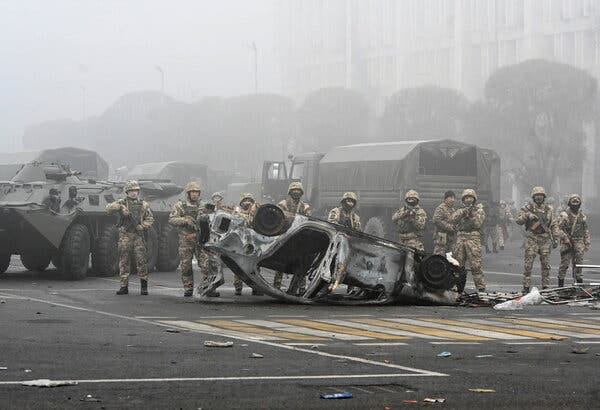An online special event hosted by the Central Asia Program at George Washington University and co-sponsored with the Carnegie Endowment for International Peace, the Davis Center for Russian and Eurasian Studies, the Oxus Society for Central Asian Affairs, and RFE/RL on January 10, 2022.
The riots that erupted on January 5, 2021 in Almaty and then spread to Kazakhstan’s other cities have taken the government by surprise, but signals of unrest were present since Nazarbayev left the presidency in 2019. The dismissal of the Cabinet, the removal of Nazarbayev from the Security Council presidency, the storm of the Parliament and the Almaty airport, as well as police violence will, without a doubt, mark a turning point in the history of Kazakhstan. At a more geopolitical level, the impact will be decisive too, as the CSTO has, for the first time in its history, sent peacekeeping troops at President Tokayev’s request.
Who are the protesters? What do they want? What are the genuine grassroots aspects and the instrumentalization of popular resentment by some elites for internal struggles? How can the regime survive such clashes? What will be the regional impact of the crisis in what was until then the most stable and prosperous country of Central Asia?
Speakers:
Merkhat Sharipzhanov, RFE/RL’s Sr. Central Newsroom Correspondent, former Director of Kazakh Service;
Temur Umarov, Research Consultant at Carnegie Moscow Center;
Pauline Jones, Professor of Political Science and Director of the Digital Islamic Studies Curriculum at the University of Michigan (UM);
Barbara Junisbai, Associate Professor of Organizational Studies, Pitzer College;
Nargis Kassenova, Senior Fellow and Director of the Program on Central Asia at the Davis Center for Russian and Eurasian Studies (Harvard University);
Moderator: Marlene Laruelle, Director and Research Professor, the Institute for European, Russian and Eurasian Studies (IERES), The George Washington University.

